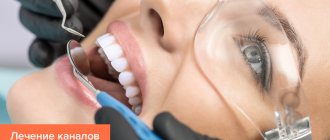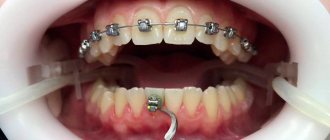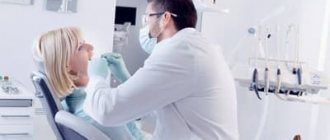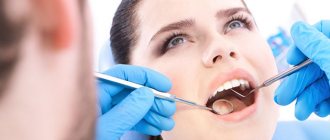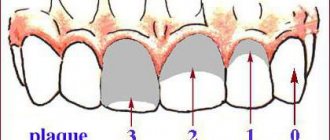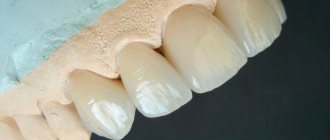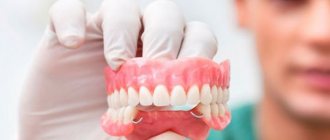Certificate of oral sanitation
is an official document that confirms the patient’s dental health. This certificate is issued by a dentist after a thorough examination of the oral cavity and the sanitization itself.
What is oral sanitation?
Sanitation
is a complex of therapeutic and preventive measures at the dentist. Depending on the condition and health of the teeth, oral sanitation may include:
- Treatment of caries and pulpitis;
- Professional oral hygiene;
- Treatment of periodontal diseases;
- Removal of diseased teeth.
To carry out sanitation, the patient must visit the dentist by appointment, undergo an examination, and obtain a medical report. If the teeth are in order, a certificate is issued immediately; If there are dental diseases, they must be treated first. And only after all the procedures, the dentist gives a certificate of sanitation of the oral cavity - with the seal of the dental clinic or clinic and with the signature of the attending physician. The certificate is always issued in a standard format and is accepted in all medical institutions.
Important:
A certificate of oral hygiene can be obtained from both public and private dentistry. Therefore, if it is urgently needed, it is better not to waste time in queues at a government agency, but to go to a trusted clinic with high-quality medical equipment.
In what cases and why is a certificate from a dentist necessary?
How to get a certificate of oral sanitation? | Dentistry As-Stom | St. Petersburg (SPb)
Ask a question to the doctor
A certificate of sanitation of the oral cavity is a document that is often required before serious surgical interventions, the child’s admission to kindergarten or school, before a long business trip or travel during which dental treatment is not possible, or before performing a certain type of work (for employees harmful chemical or food production, for example). What lies behind the words “oral sanitation” and what exactly needs to be done to get the coveted certificate?
Certificate from the dentist for surgery
If the patient is undergoing a major operation in the near future, a certificate from the dentist is needed among other documents confirming the patient’s health. A dentist's opinion can reduce the number of complications after surgery. Our oral cavity and teeth are connected by blood flow to the entire body, and if a focus of inflammation remains somewhere, this can seriously harm a person already weakened after surgery.
In addition, during the operation itself or during the rehabilitation period, existing dental diseases (caries, pulpitis, periodontitis) can worsen and cause complications. That is why, before a planned operation, it is necessary to treat all teeth at least a month in advance, make sure that nothing threatens the health of the oral cavity, and obtain a certificate, without which the surgical operation will be impossible.
What is oral sanitation?
Sanitation (from the Latin sanatio - treatment, recovery) is a whole range of measures aimed at eliminating disorders and diseases of the oral cavity and general dental health. In other words, this is everything that is required to maintain healthy teeth.
Oral sanitation includes:
Professional teeth cleaning (removal of tartar and plaque, cleaning of interdental spaces)
Treatment of dental caries (all carious cavities, as well as the initial stage of caries)
Treatment of complications of dental diseases ( pulpitis , periodontitis )
Prosthetics and implantation of missing teeth
Removal of damaged or hopelessly diseased teeth
Elimination of foci of infection (treatment of gums and inflammation in the oral cavity)
Correction of deformed teeth and orthodontic treatment
Thus, about a patient who has undergone complete sanitation of the oral cavity, we can say that from a dental point of view he is a relatively healthy person, and he has taken all measures to prevent diseases of the teeth and gums.
What is the difficulty in registration?
There may be some difficulties on the way to obtaining a document confirming the satisfactory condition of your teeth. For example, a certificate is needed to enroll a child in an educational institution urgently, but the doctor discovers some kind of disease. Treatment can take a very long period. During this time, another may be accepted to take your child's place.
Or, people who do not undergo a professional examination in a timely manner may simply not be allowed to perform their work duties.
Video on the topic:
How is oral sanitation performed?
Sanitation of the oral cavity can be a rather lengthy process - especially if the oral cavity is in a neglected state, and teeth will need to be treated in several steps, for example, with prosthetics or pulpitis. Therefore, if you need a certificate of sanitation at a certain point, you should take care of going to the dentist in advance and determine what procedures and in what quantity will be required, and what amounts will have to be spent on treatment.
Therefore, sanitation always begins with an examination by a dentist-therapist and the prescription of treatment. At this stage, an orthopantomogram of the teeth (panoramic X-ray image of the oral cavity) is taken, which makes it possible to accurately determine all diseases, including “dormant” ones, such as a maturing dental cyst .
Get it yourself or buy it?
A certificate from a dentist is a document confirming that the teeth and gums in the patient’s mouth are in healthy condition and cannot cause any infection. Such a document may be required in a variety of life situations. For example, if it is necessary to go to hospital for any operation or when registering during pregnancy.
Why is it better for pregnant women to buy a certificate from a dentist than to go to an appointment?
The main difficulty in officially obtaining this document is that the doctor will only issue it if the gums and teeth are truly healthy. Otherwise, you will need to undergo treatment first. Some teeth may need to be removed and others need fillings. Naturally, with such a development of events, it will not be possible to obtain a certificate in one day. However, there are situations when it is needed very urgently.
If you recently visited the dentist and are sure that your oral cavity is in perfect order, you can refuse to visit the dentist’s office again. It is enough to buy a certificate from the dentist. This will allow:
- save a lot of effort (despite the abundance of all kinds of dental clinics, there are still long queues, especially in government institutions);
- save yourself from additional unpleasant experiences (there is no doubt that visiting the dentist gives at least a little pleasure to someone);
- in the shortest possible time and without any bureaucratic delays, receive the necessary document for submission to one or another authority.
Sample certificate of oral sanitation
The first line indicates the number of the certificate issued. On the second, the doctor writes the patient’s first, last and patronymic names. The third indicates his age and who issued the certificate. Next comes a column to indicate the conclusion and recommendations. The doctor puts the date of issue at the bottom left and his signature on the right.
Sanitation of the oral cavity is a fairly important measure, which is prescribed in many cases. A certificate of its completion may be needed upon admission to kindergarten, school, universities, before surgery, during pregnancy and before childbirth. The main task of sanitation is to identify problems with teeth or gums. If they are detected, the doctor prescribes the necessary treatment measures.
{SOURCE}
Sanitation of the oral cavity during pregnancy
It is possible and necessary to sanitize your mouth during pregnancy. Ideally, a woman should undergo comprehensive oral therapy before conceiving a child. However, it is not too late to see a dentist if you have already found out that you are pregnant.
Having an infection in the mouth is a risk for both the expectant mother and the baby. Therefore, all dental diseases must be cured.
During pregnancy, teeth become fragile and quickly deteriorate. The reason for this is calcium deficiency in a woman’s body, hormonal imbalances, changes in the composition of saliva (violation of the acid-base composition).
The safest period for dental treatment for pregnant women is the second trimester, when the risk of drug exposure to the fetus decreases.
Why do you need oral sanitation before implantation?
Dental implantation is a complex surgical operation, and the main condition for its success is sterility. Any infection, for example, from a carious lesion can enter the hole and cause an inflammatory process.
To eliminate the risk of infection, the dentist performs a complete sanitation of the mouth. Without this, no one can guarantee you 100% implant success. If you refuse sanitation, and after some time the dental implant falls out (does not heal), then you will have to have a second operation at your own expense.
How often should you have a dental checkup and why?
Every person needs a preventative dental examination approximately once every six months, even if nothing bothers him.
Dental diseases develop quickly. And the first signs, which can be visually noticeable, appear within 6 months.
A child's dental checkup plan consists of more frequent visits. It is advisable for children to see a doctor once every three months. Thanks to regular dental examinations, caries and other diseases can be detected at an early stage, when gentle, painless methods can be used to treat them.
Professional teeth cleaning is the optimal solution before extraction or prosthetics
The presence of foci of inflammation and pathogenic microflora in the oral cavity during surgery or prosthetics is a high risk of complications for the patient, which will not only delay the recovery process, but can also negate all the doctors’ manipulations. That is why you should not neglect professional dental hygiene, which will help get rid of tartar even in the most inaccessible places.
The EURODENT clinic network provides professional teeth cleaning using modern and safe equipment (find out more by following the link). We use:
Ultrasound device “Piezon Master-600” (Switzerland). It allows you to remove plaque and tartar without damaging the enamel thanks to gentle ultrasonic vibration. The cleaning process also restores the natural color of the enamel. Most often used in conjunction with the Air-flow system.
- Air-flow system (Switzerland). Plaque removal occurs under the influence of an aqueous solution of calcium bicarbonate, which is supplied under high pressure. The use of the “Air-flow” system allows you to remove the densest plaque both from the front part of the tooth and from the interdental space, even with crowded teeth. It is an excellent prevention of periodontitis and periodontal disease. Removing pigmented plaque allows you to restore the whiteness of your teeth without damaging the enamel. The cleaning procedure should be carried out 2-3 times, after each session it is necessary to coat the teeth with fluoride-containing preparations.
- Polishing the surface of teeth with abrasive pastes. This is a mandatory step in professional oral hygiene. Even with the most thorough removal of plaque and tartar, the tooth surface remains rough. This contributes to the formation of new dental deposits from microparticles of food and saliva, which over time will again become a source of pathogenic bacteria. Tooth polishing makes the surface of the teeth smooth and even, making it much more difficult for plaque to form. During the polishing process, special grinding attachments of various configurations and abrasive pastes of different grain sizes are used. The polishing procedure allows you to consolidate and preserve for a long time the effect of professional teeth cleaning.
- Device "Vector" (Germany). The principle of operation of the Vector device is based on the use of ultrasonic vibrations directed along the axis of tooth growth (sliding vibrations) and treatment of the tooth surface with a suspension of calcium hydroxyapatite. “Vector” effectively removes subgingival plaque and tartar, which serve as a source of infections, and polishes the tooth root - this allows you to preserve the effect of professional teeth cleaning for a long time.
If you want to maintain the health of your teeth for a long time and avoid complications after installing implants, braces or tooth extraction, be sure to take a course of professional dental hygiene 1-2 times a year. We remind you that the initial consultation with our specialists is free. Also available to patients of the Eurodent clinic.
Based on: 4 votes
